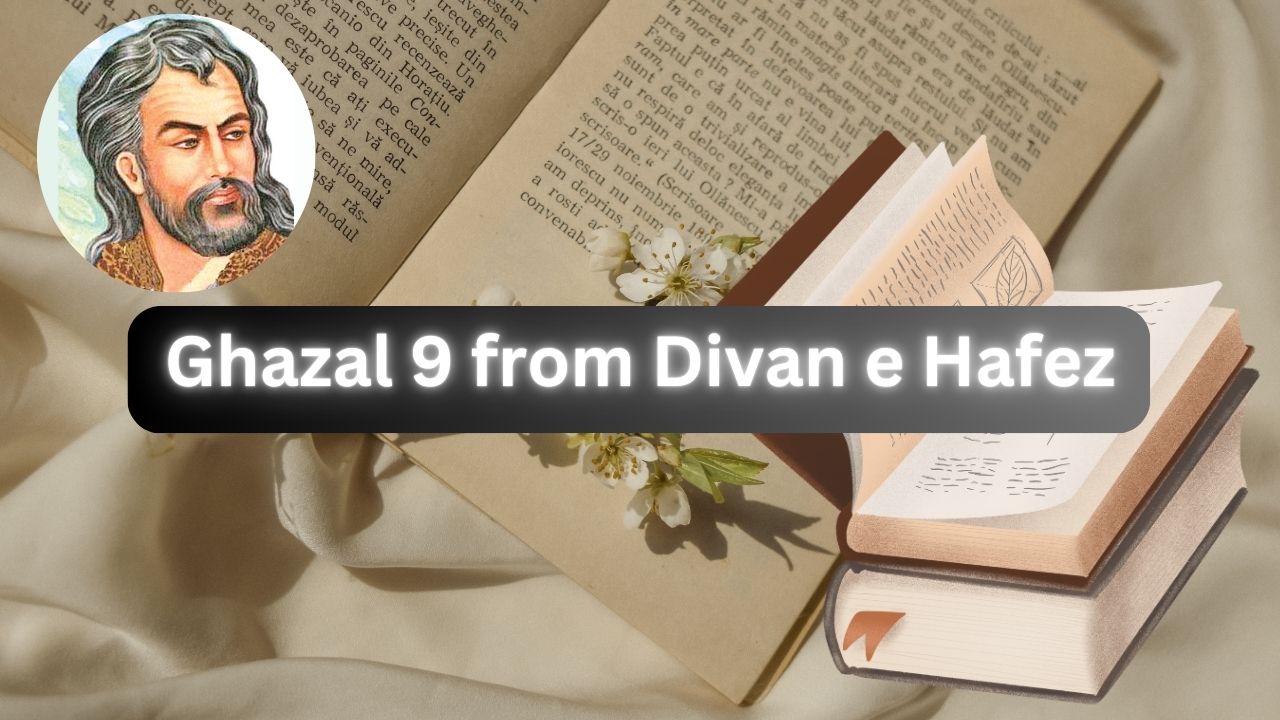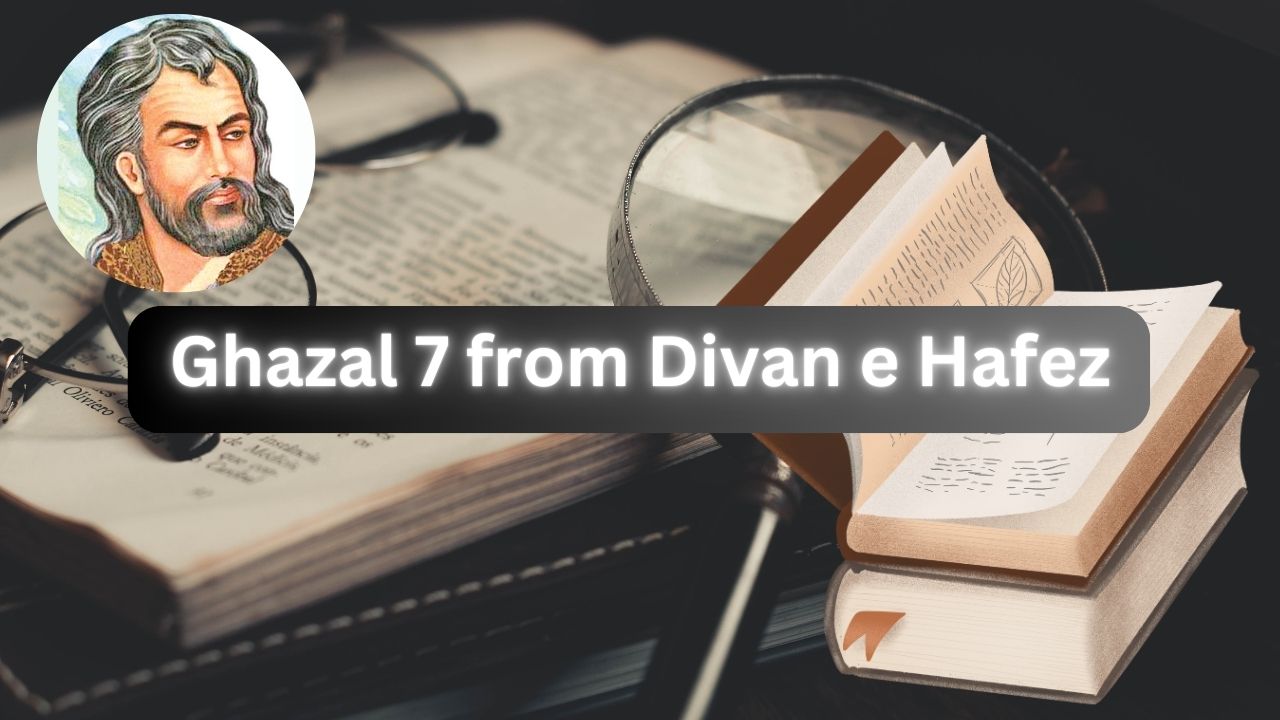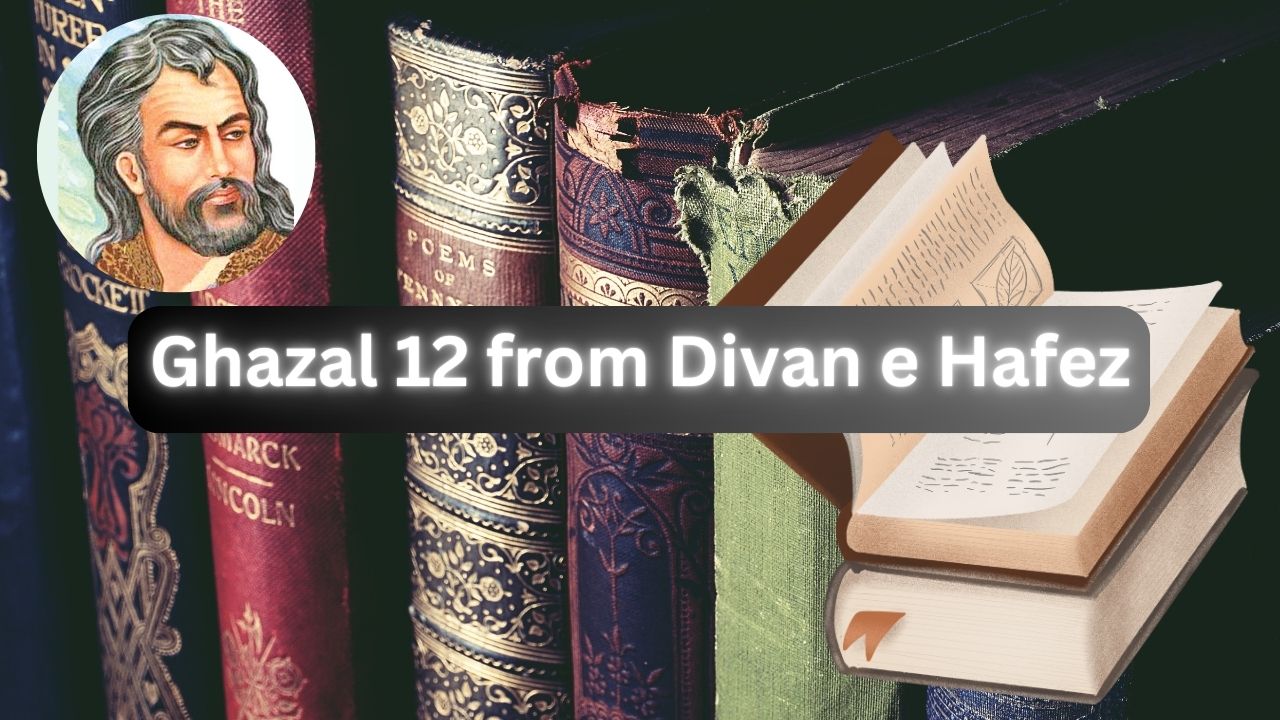In this post we discuss Ghazal number nine. In this Ghazal Hazrat e Hafez says:
رونق عهد شباب است دگر بُستان را
میرسد مژدهٔ گل بلبل خوشالحان را
The garden blooms anew, in the era of youth’s reign, The nightingale receives glad tidings of the rose’s refrain.
دوباره نیکویی و گرمی ِ بازار ِ دوران ِ جوانی به بستان برگشته است. و به بلبل ِ خوش آواز، مژدهیِ آمدن ِ گل میرسد. بهجز این، میتوان گفت که بستان باعث شده است که روزگار ِ جوانی ِ ما رونق بگیرد و بازار ِ آن گرم شود. در این حالت میتوان بلبل ِ خوشالحان ِ مصراع ِ دوم را خود ِ شاعر در نظر گرفت که به او مژدهیِ گُل (دیدار و وصل ِ یار) رسیده است.
The kindness and warmth of the youth has returned to the garden or the Spring has come. And the good news of the arrival of flowers reaches the nightingale. Moreover, it can be said that the garden has made our youth flourish and its prosperity warms up. In this case, the melodious nightingale of the second stanza can be considered the poet himself, who has received the good news of the flower (meeting and connection of a friend). We have a new chance to celebrate and enjoy our youthful life.
ای صبا گر به جوانان چمن باز رَسی
خدمت ما برسان سرو و گل و ریحان را
O breeze of Saba, if by the young ones of the meadow you pass, send our greetings and devotion to cedar, flowers and basil.
ای باد ِ صبا! اگر به ِ چمن های تازه سبز شده رسیدی، سلام و ارادت ِ ما را به سرو و گل و ریحان برسان. از این جمله به نظر میرسد که خود ِ شاعر از چمن و بوستان دور است. و از دور و به واسطهیِ باد ِ صبا، سلام و عرض ِ چاکری و ارادت ِ خود را به جوانان ِ چمن میرسانَد. جوانان ِ چمن هم میتواند همان درخت ِ سرو و گُل ِ سرخ و گیاهان ِ سبز و خوشبویِ سبزهزار باشد که پس از زمستان به تازگی روییدهاند؛ و هم جوانانی که با رونق ِ عهد ِ شباب، در بوستان و چمن به تماشا و عیش و نوش مشغول اند.
O wind of Saba! If you reach the newly green lawn, send our greetings and devotion to cedar, flowers and basil. From this line, it seems that the poet himself is far from the grass and the garden. And from afar and through the breeze of Saba, he conveys his greetings and the expression of devotion to the young people who are enjoying the Spring on newly grown grasses. The youth of the grass can also be the cypress tree and the red flower and the green and fragrant plants of the lawn that have just grown after the winter; And also the young people who are busy watching and drinking in the garden and lawn, enjoying the prosperity of their youth. Hafez here in my opinion sends his greetings and devotion to people who are enjoying their life and advocates living merry and happy.
گر چنین جلوه کند مغبچهٔ بادهفروش
خاکروبِ درِ میخانه کنم مژگان را
Should the young wine-seller display such charm, I’d sweep the tavern threshold with my eyelashes.
اگر مغبچهیِ بادهفروش، اینچنین خود را نشان بدهد و ناز و کرشمه و دلبری کند، مژههای خودم را جارویِ در ِ می خانه خواهم کرد. اگر مغبچهیِ بادهفروش چنین به چشم ِ من در آید و دل از من ببَرَد، حاضر ام برایِ آن که مقیم ِ میخانه باشم، در هیئت ِ یک خدمتکار، در ِ میخانه را جارو بزنم. آن هم با مژههایِ خودم.
If the young Mongolian selling wine appears so cute and charming, I will sweep with my eyelashes the door of the tavern. If the wine-seller catches my eye like this and takes my heart away, I am ready to sweep the door of the tavern as a servant in order to be a resident of the tavern. Here, Hafez is willing to sacrifice his eye, the eye which is one of the dearest parts of the body, to be in the circle of friends in the tavern. Hafez is willing to sacrifice everything to be in the tavern with someone who understands life and lives it.
ای که بر مه کشی از عَنبرِ سارا چوگان
مضطربحال مگردان، من سرگردان را
You who draw the moon with amber-scented polo mallets wide, Do not perturb me, the wandering soul.
ای معشوقی که زلف ِ مشکین و تابدار ِ خود را مانند ِ چوب ِ چوگان بر صورتات افکندهای (که انگار در بازی ِ چوگان گوی را به سمت ماه پرت کردهای!)، من ِ آشفته را با دیدن ِ ماه ِ رخات و حرکت زلفات به این سو و آن سو پریشان و مضطربحال نکن!
I am confused by seeing the moon of your face and the movement of your hair and the scent of your amber. Don't make me more confused, I, who am wandering soul already! Hafez is already in love with the beauty of his beloved, and now he asks his beloved not to make him more anxious and confused with the makeup of his face and hair. Don’t make it hard for me to decipher your message.
ترسم این قوم که بر دُردکشان میخندند
در سر کار خرابات کنند ایمان را
I fear those who mock the drinkers may, In the end, disrupt faith in the tavern’s way.
با حالتی طعنهآمیز میگوید: میترسم که آن گروه و دستهئی که به شرابخواران میخندند و آنها را مسخره میکنند، خودشان سرانجام ایمان ِ خودشان را در سر ِ کار ِ خرابات و کارهای عیاشی و فسق، دربازند و بدهند!
He says with a sarcastic expression: I am afraid that those groups who laugh at the drunkards and make fun of them, will eventually lose their faith in the work of destruction and revelry and debauchery! Hafez taunts those who appear to be religious, that they may do any indecent act in secret and eventually lose their reputation. People of Sharia question the lifestyle of merry and happy people, but in fact, in the end, it will be clear that they are all hypocrites, and they secretly have a different lifestyle than what they show on the surface.
یار مردان خدا باش که در کشتی نوح
هست خاکی که به آبی نخرد طوفان را
Be a friend to God’s men, for in Noah’s ark, you’ll find out, there is soil that the storm’s water cannot reach.
توفان را به آبی نخریدن، نوعی بیاهمیت و حقیر شمردن ِ توفان است. میتوانم انسان یا مخلوقی که از خاک خلق شده را تجسّم کنم که چون در کشتی ِ نوح است، دیگر توفان در چشم ِ او ارزشی ندارد. و شاعر، همراهی و یاری با مردان ِ خدا (نوح) را دلیل ِ این نجات دانسته.
Human being who is created from soil, because he is in Noah's ark, the storm is no longer a concern for him. And the poet considers companionship and help with the men of God (Noah) as the reason for this salvation. When you are in God’s men friendship you do not have any concerns. According to the old belief, humans came from the soil and the soil has a weak point against the flood and the flood can wash it away. A man who is created from soil, when he is with God’s men, he does not have to worry about any flood.
برو از خانهٔ گردون به در و نان مطلب
کآن سیهکاسه در آخر بِکُشد مهمان را
Seek not bread from the wheeling globe, For the dark-bowled host will slay the guest in the end.
اگر به طلب ِ نان به در ِ خانهیِ گردون آمدهای، از آن خارج شو و از او طلب ِ نان مکُن! چون که این بخیل ِ رذل، سرانجام مهمان را خواهد کُشت. می گوید این گردون، مثل ِ شخص ِ سیاهکاسهئی است که نه تنها نان به تو نخواهد داد، بلکه در آخر تو را خواهد کشت! فرار کن!
If you have come to the door of this wheeling globe, to ask for bread, that is to earn a living, leave it and don't ask for bread! Because this host will eventually kill the guest. He says that this world is like a dishonored host who will not only don’t give you bread, but will kill you in the end! Run! Hafez says that don’t devote all your life to earn a fortune in this world, because this earthly riches will be lost when you die. Life is not just for accumulating wealth, but life should be lived.
هر که را خوابگه آخر، مشتی خاک است
گو چه حاجت که به افلاک کشی ایوان را
Someone, who a handful of dust is the final bed, What is the need to build a tall palace in this world?
خوابگاه ِ پایانی ِ هر کسی، یک مشت خاک است. بگو چه نیازی است و چه فایده دارد که خانه و عمارت و کاخ ِ خود را تا بالای آسمان ها برسانی و ایوان و قصر ِ بلند بسازی؟ همه سرانجام در زیر ِ مشتی خاک خواهیم خوابید.
Everyone's final home is a pile of dirt. Tell me, what is the need and what is the benefit of raising your skyscraper, mansion, and palace to the top of the sky and building a high porch and palace? We will all eventually sleep under a handful of dirt. The intention of Hafez is that you should not spend your whole life building palaces that you will not even have the opportunity to use when your death will come, but also seek other meanings in the life.
ماه کنعانی من! مسند مصر آنِ تو شد
وقت آن است که بدرود کنی زندان را
My Canaanite moon! Egypt’s throne is now yours, It’s time to bid the prison farewell, let your freedom shine.
کسی را به یوسف ِ پیامبر مشابهت میدهد و به او میگوید که دوران ِ سختی ِ او به پایان رسیده است و میبایست زندان را بدرود کند که سرانجام مسند ِ مصر به او رسیدهاست. کنعان، جدا از نام ِ سرزمینی که زادگاه ِ یوسف است و عبارت ِ ماه ِ کنعانی که اشاره به یوسف و داستان ِ او است، به روایاتی نام ِ فرزند یا فرزند ِ فرزند ِ نوح است. و گویا او از دستور ِ نوح در زمان ِ توفان سرپیچی میکُنَد و نجات نمییابد. و این نام در این بیت، در این معنا، تناسبی با طوفان ِ نوح و کشتی ِ نوح که در بیت ِ ششم ِ این غزل از آن یاد شده ایجاد کردهاست.
He compares someone to the Prophet Joseph and tells him that his hard time is over and he should leave the prison, that he has finally reached the throne of Egypt. Canaan, apart from the name of the land that is the birthplace of Joseph and the expression of the month of Canaan, which refers to Joseph and his story, according to traditions, is the name of the child or the child of the child of Noah. And it seems that he disobeyed Noah's order during the flood and was not saved. And this name in this verse, in this sense, has created a harmony with Noah's storm and Noah's ark mentioned in the sixth verse of this Ghazal.
Here, in my opinion, Hafez asks us not to be slaves to worldly wealth. He says we have been freed from this self-made prison that has enslaved us to get richer. We have become our own kings and it is time to rule our lives. We think we are working for ourselves, but in reality we are slaves in prison. Hafez gives us the good news that you are freed from this prison of life's slavery and start to reign in it.
حافظا می خور و رندی کن و خوش باش ولی
دام تزویر مکن چون دگران قرآن را
Drink wine, live freely, and be merry, Hafez, do, But cast not the Quran’s snare as others tend to.
ای حافظ! می بخور! رندی بکن! و خوش باش! اما مانند ِ دیگران، قرآن را دامی برای مکر و فریب دادن و به دروغ زیور کردن ِ کارهای خودت قرار نده. واژهیِ «قرآن» در این غزل آمدهاست. و در بیتهای این غزل تلمیحهایی از آیهها و قصّههای قرآنی نیز آمده. به نوعی شاعر در بیت ِ آخر، به صراحت این موضوع را یادآوری کرده است. به شکلی که یعنی از قرآن نیز میتوان به درستی استفاده کرد و آن را دام ِ تزویر نکرد.
Hafez! Drink! Be rend! And be happy! But unlike others, don't make the Quran a trap for trickery and deception and don’t embellish your work with lies. The word "Qur'an" is mentioned in this Ghazal. And in the verses of this Ghazal there are hints from Quranic verses and stories. In a way, the poet has clearly reminded this issue in the last stanza. In a way that means the Qur'an can also be used correctly and not fall into the trap of falsification. Maybe he intends that, even though he is using Quranic verses in his poems, his message is different from those who use it as bait to mislead and hypocrisy.





